The OHA's Here to Care campaign launched on May 11, 2022. It was designed to remind Ontarians that Ontario's Hospitals are Here to Care – against adversity and beyond challenges, Ontario's hospitals have and will continue to be there for their communities.
The Ontario Hospital Association (OHA) is honoured to continue supporting our hospital members as we navigate a rapidly changing environment and look to the future. We are proud of Ontario's hospitals for your extraordinary efforts to meet the healthcare needs of Ontarians in the face of ongoing disruption due to COVID-19.
Over the past year, the OHA strived to balance responding to the immediate needs of hospitals with the need for long-term thinking about the future of the hospital sector and the broader healthcare system.
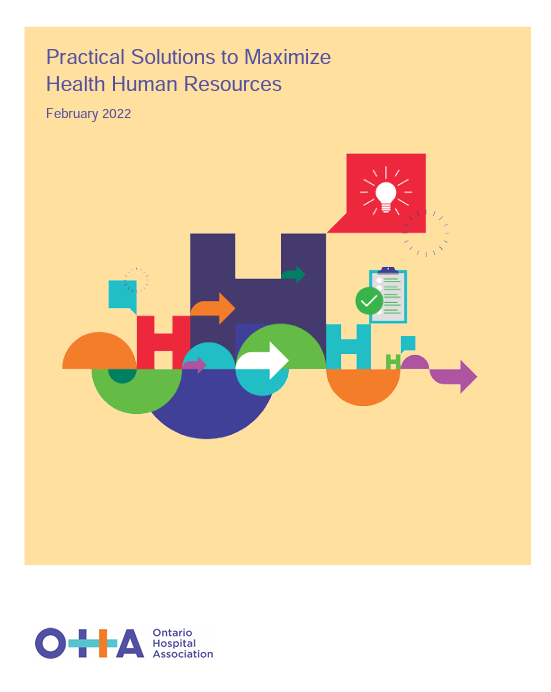 The significant health human resource (HHR) pressures facing the sector has emerged as a top priority for members. To address this urgent priority, the OHA sought valuable input and insights from members to inform our pre- and post-election government outreach and to propose both short- and longer-term solutions to these HHR challenges on behalf of hospitals. The OHA will continue to advocate on behalf of all member hospitals in the weeks and months ahead to ensure that the government understands that HHR shortages across the entire continuum remain a serious concern, and much more needs to be done.
The significant health human resource (HHR) pressures facing the sector has emerged as a top priority for members. To address this urgent priority, the OHA sought valuable input and insights from members to inform our pre- and post-election government outreach and to propose both short- and longer-term solutions to these HHR challenges on behalf of hospitals. The OHA will continue to advocate on behalf of all member hospitals in the weeks and months ahead to ensure that the government understands that HHR shortages across the entire continuum remain a serious concern, and much more needs to be done.
The OHA also provided ongoing support to members with the province's pandemic response, advocating to government on a range of labour relations, legal and policy issues. This included calling for responsible action from the government and public during COVID-19's punishing Omicron wave, which introduced new challenges to hospital capacity. We continued to monitor the pandemic's financial toll on the sector, communicating this impact to government to ensure that investments were made to maintain hospitals' financial stability.
To help strengthen the sector now and in the future, the OHA also invested in the OHA's core member services. This has included continued work with HIROC Management Limited to develop a provincial strategy for the improved delivery of hospital employee group benefits, expanding and evolving our data and analytics offerings, and integrating support of Ontario hospitals' education and research missions into the OHA, to ensure that we move forward together as one hospital sector.
The balance between short- and longer-term needs, together with lessons learned over the past few years, will be reflected in the ongoing work to develop the OHA's next strategic plan, which will take effect in April 2023.
This member report highlights the OHA's work on behalf of the sector in the final year of our current strategic plan. This includes efforts to support our hospital members with urgent and emerging priorities, such as HHR challenges to the sector, and initiatives aimed at amplifying hospitals' evolution, innovation and leadership as the system transforms.
Helping Hospitals Rebuild and Recover
Strengthening the Province's Healthcare Workforce
Strengthening hospitals' healthcare workforce has been a primary area of focus for the OHA. An integral part of the OHA's pre-Budget and post-election government advocacy was to support hospitals in addressing the HHR pressures impacting the system. To this this end, the OHA led various HHR-focused efforts which helped inform and guide our key advocacy priorities.
- Government advocacy: In an addendum to our pre-budget submission, the OHA recommended funding and government policy support to enable the hiring of more critical healthcare workers over the next five years. Our provincial leadership networks – including the creation of a small, rural and northern network working group – helped inform the OHA's recommendations. Following significant engagement with members and stakeholders, the OHA also shared an HHR Policy Brief with government detailing an inventory of short- and medium-term practical solutions for improving Ontario's HHR.
HHR was also among four key priorities that were highlighted as part of pre- and post-election advocacy efforts with government, which included meetings with the newly appointed Deputy Premier and Minister of Health. We continue to advocate for a needs-based capacity plan including a multi-stakeholder, comprehensive HHR strategy from government.
- HHR Workforce Survey and Dashboard: To help inform our advocacy efforts and highlight immediate priorities on how to best address these HHR challenges, the OHA developed the HHR Workforce survey which launched in fall 2021. The survey was designed to capture key HHR indicators; results from fall 2021 and spring 2022 were shared via an interactive HHR Workforce Dashboard.
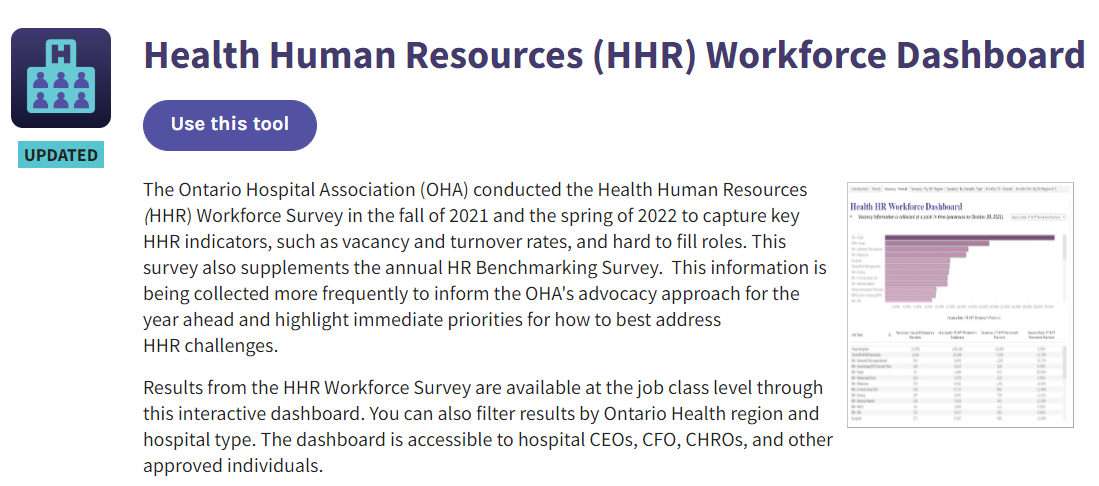
- Clinical Placement Capacity in Nursing Survey: This survey was developed to better understand and inform discussions with government related to clinical placements in hospitals, the largest providers of clinical placements for nursing students. The goal was to ensure that hospitals have the needed supports and resources (e.g., funding, training, staffing) to accommodate these clinical placements, after members expressed challenges in this area due to staffing shortages and other pandemic-related difficulties.
- Nursing Leadership Advisory Group: In spring 2022, we convened an ad hoc Nursing Leadership Advisory Group to advise the OHA on matters of policy, legislation, and funding opportunities as they relate to hospitals and HHR. In late summer 2022, the Advisory Group met with OH and MOH representatives to discuss the ongoing challenges of rising costs and reliance on agency nursing as well as other immediate HHR pressures, to help inform potential government policies and supports in these areas.
Providing thought leadership on enhancing the hospital-physician relationship has been an ongoing priority for the OHA. Supporting the relationship between hospitals and physicians is crucial to improving health service delivery, and to strengthening the province's healthcare workforce.
- Implementation of the Physician Services Agreement (PSA) 2021-2024: Because many provisions contained in the PSA impact the hospital sector, which the OHA has strongly advocated for in recent years, we established a series of ad-hoc working groups to support the work of the OMA-MOH PSA implementation team. These Working Groups are comprised of clinical leaders from across the province and serve in a neutral capacity to influence and inform the PSA implementation in a number of areas.
- Physician Engagement: As a follow-up to the OHA's hospital physician engagement, well-being and workplace culture survey administered in both 2019 and 2021, a number of hospital sites were selected to participate in qualitative study to examine barriers and facilitators to hospital-physician relationships and the current state of equity, diversity, and inclusivity in healthcare leadership. Between May and July of 2022, a diverse group of senior hospital leaders from organizations that participated in the 2019 and 2021 surveys were interviewed.
The OHA was also successful in publishing a peer-reviewed article in the Journal of Hospital and Health Care Administration which more closely examines the concept of physician engagement. It shares a summary of the OHA's findings from five years spent investigating, understanding and defining physician engagement.
Policy & Advocacy
Ontario Budget: In early 2022, the OHA's pre-budget submission to the Ontario government focused on the immediate capacity pressures facing hospitals, especially during continuing waves of the COVID-19 virus, and ensuring that the foundational financial needs of hospitals are met for 2021/22 and into 2022/23. The government had already committed to keeping hospitals financially whole throughout the pandemic and the OHA has been closely monitoring hospitals' financial stability with regular financial surveys to inform discussions with the MOH.
As noted above, the OHA's advocacy efforts aimed to highlight the healthcare system's growing HHR challenges. This included an addendum to our pre-budget submission and an HHR Policy Brief containing short- and medium-term practical solutions for improving Ontario's HHR. We continue to advocate for a needs-based capacity plan including a multi-stakeholder, comprehensive HHR strategy from government.
Pre- and Post-Election Strategy: Ahead of the general election, the OHA developed post-pandemic policy briefs to inform discussions with government once elected, which highlight four key priorities for the sector: HHR, access to care, system integration, and health research. In addition to zeroing in on one central key message throughout the campaign period – the need for long-term health system capacity and HHR planning – the OHA distributed member resources to guide advocacy and public communications throughout the campaign period.
Following the election, we held a member call for senior hospital leaders to share details of the new government and its immediate priorities. Congratulatory letters were also sent to key government Ministers, the Parliamentary assistants to the Minister of Health, and the NDP's Health Critic, emphasizing the OHA's readiness to provide recommendations and work with the government on pandemic recovery, capacity and HHR challenges. Letters to the Minister of Colleges and Universities and Minister of Economic Development, Job Creation and Trade also underscoring the importance of health research.
The OHA also had a number of meetings with the newly appointed Deputy Premier and Minister of Health to discuss challenges facing rural and northern hospitals and emergency departments, highlighting the OHA's previous work on health hubs and Ontario Health Teams (OHTs), and to share our policy proposals and recommendations related to the four priorities outlined above.
As part of our environmental surveillance, the OHA team continues to conduct ongoing research, literature reviews, and jurisdictional scans to inform our policy and advocacy work related to the pandemic response and recovery, and also to look ahead at emerging global health trends that may impact health care in Ontario.
Adaptive Public-Facing Support for Strategic Issues
An important priority for the OHA is to assist members with your public outreach to address sector-wide issues and underscore hospitals' crucial role within the system. Examples during the pandemic include the OHA's response to the revocation of CMOH Directives, such as the continuation of hospital vaccination policies and hospitals' plans to maintain protective measures to protect patient safety. Over summer 2022, we developed questions and answers to assist with growing pressure on emergency department wait times. In Ju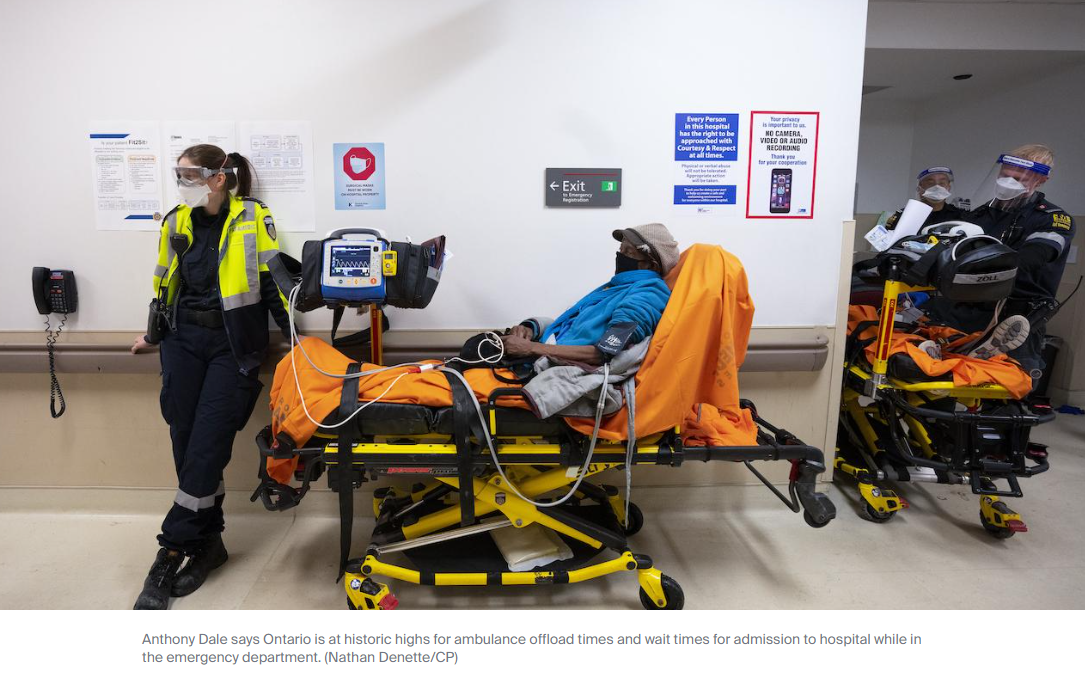 ly, OHA President and CEO Anthony Dale spoke to TVO given broad media coverage about these increasing pressures and to provide the necessary context.
ly, OHA President and CEO Anthony Dale spoke to TVO given broad media coverage about these increasing pressures and to provide the necessary context.
The OHA's Here to Care campaign launched on May 11, 2022. It was designed to remind Ontarians that Ontario's Hospitals are Here to Care – against adversity and beyond challenges, Ontario's hospitals have and will continue to be there for their communities. The message was shared broadly across the province through print and digital out-of-home placements, such as billboards, and extensive social media promotion and engagement.
Academic Mandates

In April 2022, the OHA hosted a member call to seek feedback and guidance on our emergent health research strategy with discussion rooted in the new research mandate. The mandate aims to create “A fully integrated health research and care delivery system across Ontario that drives sustainable and transformational science, clinical excellence, health equity and an agile, diverse workforce of scientists and innovators". As part of this effort, we published, Ontario's Research Hospitals: A Strategic Resource for Canada, to promote a better understanding of Ontario's hospital-based research and innovation sector and support advocacy efforts with federal and provincial governments. The OHA is also helping to promote hospital-based research through the Youth DiverSTEAM Symposium held in May 2022.
The mandate for education is to “Collaborate inside and outside hospital walls to educate and train the health professionals that Ontario needs to deliver exceptional patient care and build a high-performing health care system". A key component to support the OHA's work in this area was development of the Clinical Placement Capacity in Nursing survey created through the OHA Education Committee's HHR working group that includes hospital members, Colleges Ontario, Council of Ontario Universities, College of Nurses of Ontario and nursing leadership, Ontario Health, and the Ministries of Health and Colleges and Universities.
The OHA looks forward to advancing the academic research and education mandates in the coming year.
Ongoing Pandemic Support for Hospitals
Policy & Advocacy
As the province gradually emerged from the Omicron wave in early 2022, the government revealed its phased plan to lift public health measures. This included the revocation of directives relating to COVID-19 vaccination and testing policies for public hospitals, as well as the required personal protective equipment (PPE) for the care of suspected or confirmed cases of COVID-19 in hospitals.
The OHA met with the Chief Medical Officer of Health (CMOH) and Ministry of Health (MOH) staff to discuss a planned, orderly transition for hospitals from CMOH directives and orders into different, ongoing hospital sector policies, procedures, and practices and also consulted with members about future approaches and alternatives. While the OHA recommended retaining the order for mandatory masking to the CMOH, the MOH-issued guidance provided clear affirmation that the existing practices reflected current evidence and should be maintained through hospital policies.
Collaborating with System Partners to Plan Ahead
Throughout 2021 and in 2022, the OHA co-sponsored webinars with Ontario Health (OH) to connect hospital CEOs with OH leaders on emerging priorities related to the COVID-19 response. This included walking hospitals through the gradual resumption of non-essential, non-urgent hospital surgeries and procedures in spring 2022, and the presentation of OH's plans for optimizing care during the fall/winter months in August 2022.
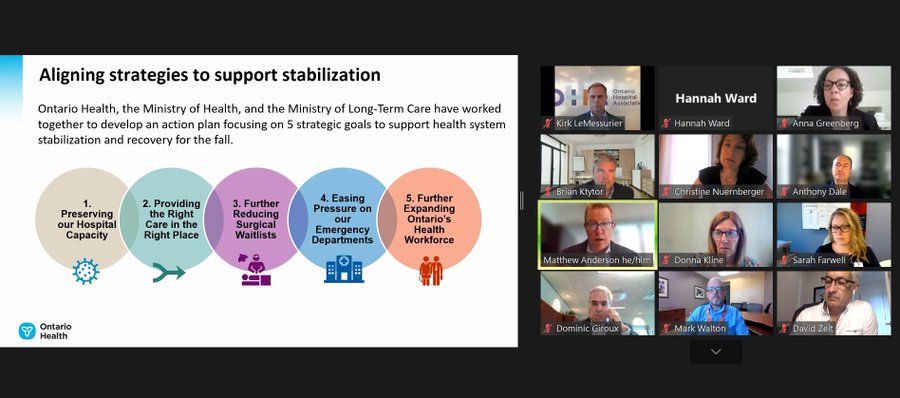 A large number of member calls and a new network
approach focused on high-value engagement for hospitals.
A large number of member calls and a new network
approach focused on high-value engagement for hospitals.
Together with the Healthcare Reciprocal of Canada (HIROC), the OHA also hosted regularly held risk forums for both national and provincial stakeholders, to support the sector in addressing legal considerations and understanding provincial trending on specific issues related to COVID.
 Building Hospital Capacity Awareness
Building Hospital Capacity Awareness
Beginning in 2021, the OHA tweeted daily reports to raise awareness of the extraordinary capacity pressures in hospitals caused by the pandemic. An online resource page also offered broader reporting of hospital capacity in the context of COVID-related hospitalizations and COVID-related critical illness (CRCI) admissions to hospital intensive care units (ICUs). In February 2022, we also began highlighting capacity pressures for pediatric critical care, both CRCI admissions and other admissions to pediatric ICUs. Complementary efforts included raising these issues with government and speaking to media about the significant capacity challenges facing hospitals. The OHA continues to monitor hospital capacity in the context of COVID-related hospitalizations and will resume reporting should these capacity pressures increase.
Serving Members through Sector-Wide Services and Solutions
Strategic Member Support & Guidance
Over the past year, the OHA developed member resources including guides, toolkits and educational sessions to support hospitals in various areas.
In lieu of the in-person Health Care Leadership Summit originally planned for fall 2020, the OHA invited hospital CEOs and Board Chairs to join a series of virtual conversations focused on healthcare leadership and the future of Ontario's healthcare system. Taking place over September and October 2022, speakers include Ontario's Deputy Premier and Minister of Health, Ontario's Deputy Minister of Health and OH President and CEO. Participants also have the opportunity for conversation on the themes highlighted by presenters and the sector's future priorities.
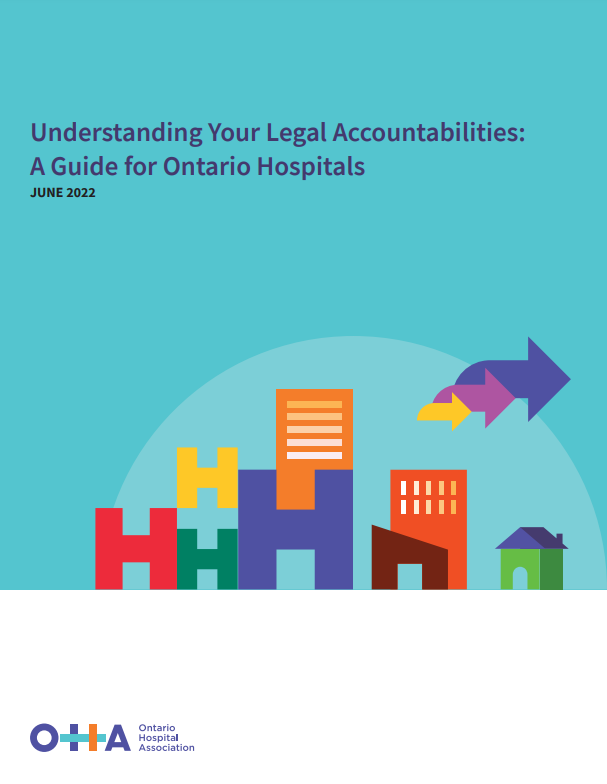
Newly revised for 2022, the fourth edition of Understanding Your Legal Accountabilities – A Guide for Ontario Hospitals was developed to assist hospitals and healthcare providers in understanding various legal accountabilities that apply to them.
The board self-assessment tool was offered free of charge to hospital members, featuring an improved reporting format that offers access to results through an online dashboard where participating organizations can view and benchmark their results using multiple criteria. Based on the framework of the Guide to Good Governance, third edition , the tool facilitates board learning to improve board effectiveness, and in turn, enhance organizational performance.
The OHA continued to offer valuable learning opportunities for hospital members to meet their targeted needs, such as the OHA's Governance Essentials for New Directors, a three-part virtual series focused on the mission-critical elements of good governance and designed specifically for newly appointed hospital board directors. We were also pleased to offer the much-awaited Ontario Healthcare Reporting Standards virtual learning series designed for individuals responsible for financial reporting, analysis, planning and decision support in Ontario hospitals.
The research unit continues to inform the OHA's policy, advocacy and communications work by exploring emergent issues impacting hospitals from a healthcare perspective and beyond. This has included the curation of anti-racism and population health resources which will be vital to system revitalization in the aftermath of the pandemic given the significant healthcare gaps further exposed during this period.
Supporting Hospitals through Member Engagement
Building on learnings from the COVID-19 pandemic, the OHA introduced a network model for member engagement that is focused on high-value engagement. The networks provide members with a forum to connect with one another, while also offering the OHA guidance on issues within their area of focus, such as the need for a provincial approach to funding Post-Acute COVID Recovery Clinics. Through Financial Leaders Network, Chief Financial Officers have opportunities to hear from the government and OH on fiscal updates and finance-related decisions, and to engage in strategic discussions regarding funding methodology.
Funding and Sustainability
In September 2021, the Hospitals Advisory Committee (HAC) was reinstated to discuss the current state and stability of hospitals in the context of operating pressures and COVID-19 recovery, as well as planning for the future. Meetings through fall/winter 2021/2022 helped provide strategic advice on various funding pressures impacting hospitals and to ensure that funding methodologies would support system stabilization. The HAC advised the MOH on topics that included COVID-19 incremental expenses, the need for capacity planning, inflation pressures and new costs of doing business, and ongoing cost pressures in the system such as HHR and inflation. Ontario's Deputy Minister of Health also attended the HAC's final meeting to express gratitude for its work, the Secretariat and the ongoing collaboration between the OHA, OH and the MOH. During the writ period, the HAC was temporarily suspended, but work with this committee will begin again in fall 2022 to discuss the strategy for various areas of focus including HHR, capacity planning, and integrated care.
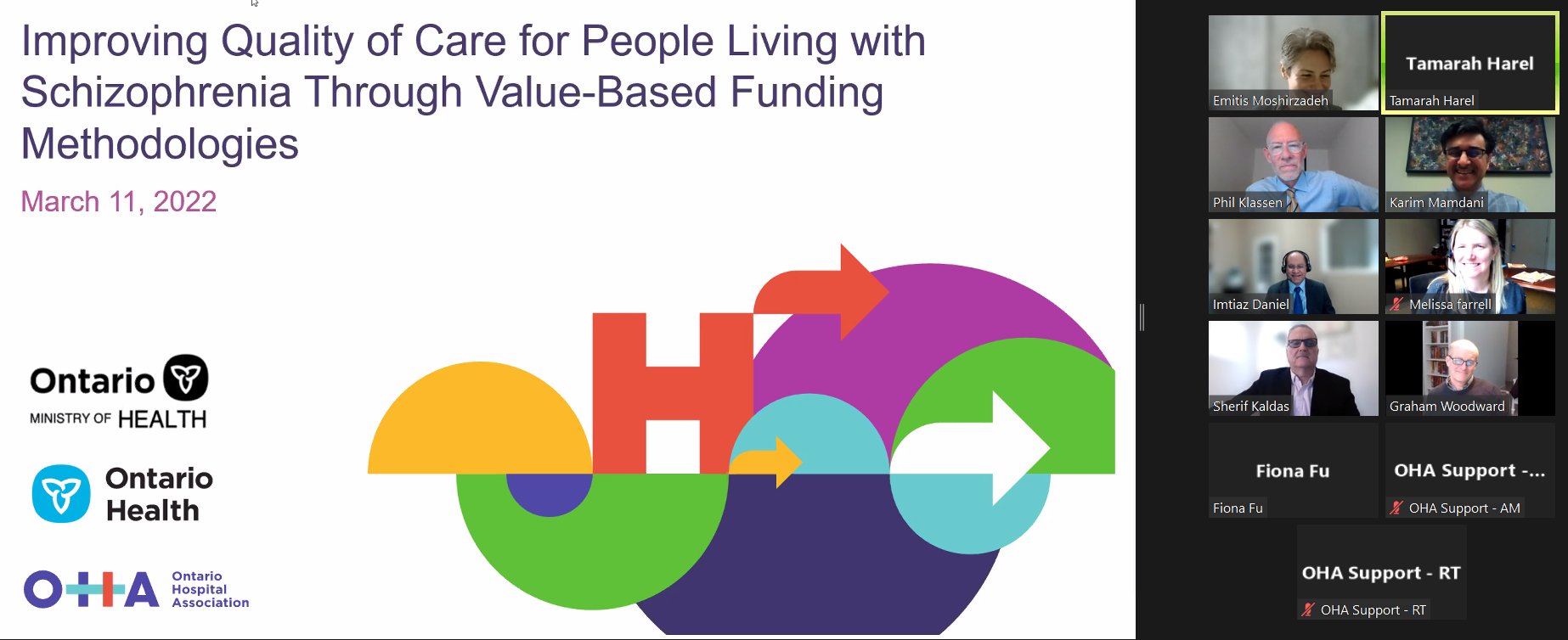 Since early 2021, the Mental Health and Addictions Funding Initiative has been exploring value-based funding methodologies for people with schizophrenia, and aims to link funding to quality via indicators from OH's Quality Standards, beginning with schizophrenia care for adults in hospitals. In March 2022, the OHA hosted a well-attended member session to spotlight the initiative, including future goals that would enable providers to follow a patient's journey into community-based care, as well as the new Mental Health and Addictions Quality Standard: Schizophrenia Care Dashboard .
Since early 2021, the Mental Health and Addictions Funding Initiative has been exploring value-based funding methodologies for people with schizophrenia, and aims to link funding to quality via indicators from OH's Quality Standards, beginning with schizophrenia care for adults in hospitals. In March 2022, the OHA hosted a well-attended member session to spotlight the initiative, including future goals that would enable providers to follow a patient's journey into community-based care, as well as the new Mental Health and Addictions Quality Standard: Schizophrenia Care Dashboard .
Data & Analytics
In January 2022, the OHA unveiled an updated Data and Analytics (D&A) platform developed to enhance the user experience, showcase new tools, and keep pace with the rapid growth of the OHA's data and analytics offerings as they evolve to meet members' changing needs. At the time of launch, the new interface included recently developed dashboards:
- In fall 2021, the OHA launched a Financial Year-End Dashboard to provide hospital leaders with an easily accessible snapshot of a hospital's financial performance to help them understand how they compare with peers, their organization's financial position and operating activities at the end of each fiscal year.
- In December 2021, the OHA launched a new Mental Health and Addictions Quality Standard – Schizophrenia Care Dashboard which allows hospitals to compare their performance with peers and can be used for performance measurement and quality improvement purposes.
- Introduced in January 2022, the interactive HHR Workforce Dashboard showcases key vacancy and turnover indicators, using data gathered from the HHR Workforce Survey. These data help inform the OHA's advocacy efforts to government relating to the sector's HHR challenges.
- The new Partner Tools section, which houses tools developed or hosted in collaboration with other system stakeholders, offered its first partner tool, the Rehabilitative Care Alliance (RCA) System Performance Dashboard.
 IDS – Deepening Perspective on the Patient Journey
IDS – Deepening Perspective on the Patient Journey
Integrated Decision Support (IDS) has seen steady growth in new participants and with respect to its capabilities and service offerings. Now, IDS can take in new datasets to support integration work, especially for OHTs. Along with hospital, homecare, community health centre, primary care and paramedic services (EMS) data, IDS now accepts Community Mental Health Association data and is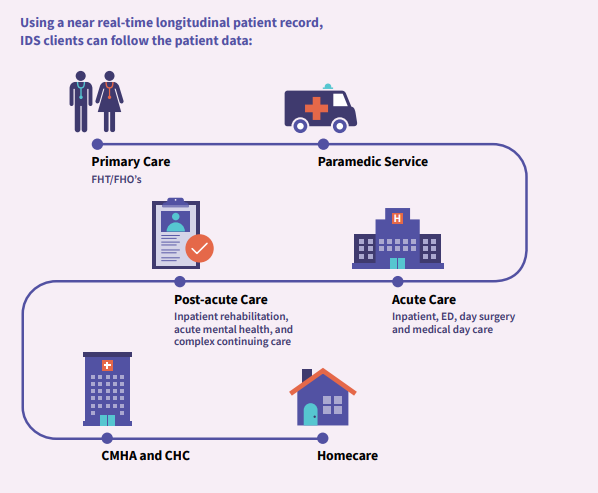 embarking on a pilot for both long-term care data and Nurse Practitioner-led clinic data. Together, these data sets aim to deepen the user perspective on the patient's longitudinal journey across multiple points of care. As well, the IDS capital upgrade/refresh went live in July 2022 which aims to enhance the analytics and geographic mapping tools available to subscribers. New multi-functional dashboards allow OHTs to track many of the metrics they are monitoring from both system and priority population perspectives.
embarking on a pilot for both long-term care data and Nurse Practitioner-led clinic data. Together, these data sets aim to deepen the user perspective on the patient's longitudinal journey across multiple points of care. As well, the IDS capital upgrade/refresh went live in July 2022 which aims to enhance the analytics and geographic mapping tools available to subscribers. New multi-functional dashboards allow OHTs to track many of the metrics they are monitoring from both system and priority population perspectives.
The IDS Governance Committee has been established to help guide IDS's work, with representation from the OH Regions and health provider sectors using IDS. Additionally, the IDS Operations Forum (CoP) has expanded its membership and an IDS OHT Working Group is working to meet the reporting and analytical needs of the over 20 OHTs it helps support.
Patient Experience Measurement Support to Hospitals
In August 2022, the OHA held a webinar introducing hospitals to Qualtrics XM, as the foundation for the OHA's new patient experience measurement program and a global leading Experience Management (XM) platform. We have invited hospitals to procure patient experience collection and reporting services through an existing Government of Ontario vendor of record arrangement, following the OHA's announcement of the termination of the Patient Experience Measurement Service Request for Proposal (RFP). The OHA patient experience team continues to work on developing member supports to streamline the procurement and onboarding process. To help organizations successfully transition to digital surveying modes offered under the new solution, the OHA developed A Guide to Adopting Digital Modes for Patient Experience Surveying and a readiness checklist of key preliminary considerations. The OHA will continue to invest in customizing the Qualtrics platform to meet hospitals' collective needs, and to evolve this solution over time to drive the improvement of patient care across the sector.
Shaping a Provincial Benefits Strategy
Work on the provincial benefits strategy initiative continues to progress, and in April, the OHA and HML introduced the Hospital Advisory Group which helped to inform the development of the upcoming Provincial Benefits Strategy RFP and participation agreements. Both the OHA and HML Boards approved the creation and incorporation of a new not-for-profit entity formally introduced to members in May 2022 and held its first board meeting in July 2022. Healthcare Collaborative Benefits Inc. (Collaborative Benefits) will be responsible for the provincial delivery of the healthcare employee group benefits plan. The new entity aims to deliver healthcare employee benefits through a model and structure that is co-designed by the participating healthcare employers, and to provide innovative approaches that enable cost-savings, enhanced employer and employee experience and greater efficiency for participating healthcare organizations. OHA and HML management teams hosted a webinar in early September 2022 with all hospitals to launch the participation agreement signing process with the intention that the procurement process will be led by Collaborative Benefits in fall 2022.
Labour Relations
The OHA team commenced negotiations with the Canadian Union of Public Employees (CUPE) and Service Employees' International Union (SEIU) for a renewed collective agreement at a joint table. Negotiations occurred in late September 2021, with mediation also taking place in September as well as May 2022, but the parties were unable to negotiate an agreement. The negotiations proved to be complex given the impact of Bill 124, the Protecting a Sustainable Public Sector for Future Generations Act, 2019, which restricts health care worker and other public sector employee compensation to a maximum increase of one per cent for a term of three years – as well as the ongoing response to the COVID-19 pandemic. As a result, the parties proceeded to interest arbitration dates in early June 2022 and are currently awaiting the decision of the board of arbitration.
The OHA also engaged in collective bargaining with the Ontario Public Service Employees' Union (OPSEU), with negotiations and mediation occurring in April and May 2022. These were also challenging negotiations given the context, and as a result, the parties proceeded to interest arbitration hearings in June 2022. A decision consistent with Bill 124 that also contained modest amendments in line with other hospital agreements was issued in July 2022.
Bill 124 was raised by members as one of several factors leading to healthcare worker recruitment and retention challenges. The OHA did not support Bill 124 when it was introduced, and as part of our post-election government advocacy, the OHA recommended that government commit to a planned and deliberate exit from the current period of legislated wage restraint. This would provide an opportunity to address compensation and other contributors to current HHR challenges within hospitals and across the entire healthcare workforce.
Organizational/Partner Updates
The OHA is committed to exercising its duties and obligations to ensure effective stewardship of Healthcare of Ontario Pension Plan (HOOPP). Together with the other Settlors of the Plan, the OHA remains focused on the pension accounting treatment of HOOPP and its impact on HOOPP's independence and ability to deliver on its pension promise. The OHA continues to work with HOOPP Trustees and Observers to recruit appointees with the skills, attributes and behavioural strengths needed to govern HOOPP into the future.
In January 2022, the OHA introduced the Proximity Institute, an independent charitable organization founded by the association that is dedicated to enabling effective leadership at the most senior level in Ontario hospitals. Reflecting its close affiliation with the OHA, Proximity works in partnership with CEOs and their leadership teams to understand the contextual realities facing Ontario hospitals in order to drive action on the priorities that matter most. Its long-term ambition is to measurably close the leadership gap facing Ontario's hospitals by working collaboratively to identify, develop and ready a quality pipeline of emerging CEO talent.